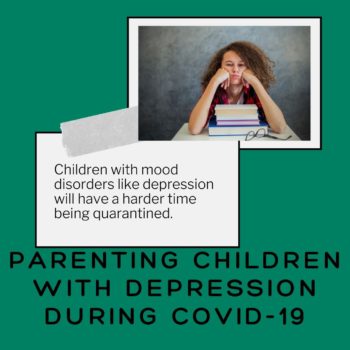Parenting Children With Depression During COVID-19

By Dr. Lauren Barry, Director of Clinical Initiatives and Data Analytics
For children who struggle with mental health issues, being at home during COVID-19 normalizes many of the behaviors that are generally warning signs for depression – staying in bed all day, not showering or getting dressed and lack of interest in activities. It’s understandable given the current circumstances that your child may want to wear pajamas and stay in their room all day, but children with depression can quickly slip into a black hole if this behavior continues for days or weeks.
Children with mood disorders like depression have a harder time being quarantined, especially teens who rely heavily on social interaction and peer support. It’s important that your child continues to take prescribed medications and schedules “visits” with their provider via Telehealth or by phone.
To help your child stay mentally healthy, you can work with them on coping strategies that will help improve their mood. One technique, called “behavioral activation,” decreases isolation by increasing positive activities. Parents can work with children by identifying small, daily goals and rewarding their child when goals are achieved.
Let your child decide what goals they want to set and activities to do at home. Depending on the level of depression, it may be as simple as taking the dog for a walk, baking cookies or playing a video game with a sibling. Ideally, you want to work with your child each day, to plan activities that will include basic hygiene, movement, using their brain (ideally by participating in remote learning) and some type of social connection.
If your child is not currently in treatment but seems to be exhibiting the symptoms of depression including sadness, irritability, lack of motivation, sleeping problems, appetite changes, concentration issues or feelings of hopelessness, check in with them about how they’re feeling. Focus on listening. You can’t fix the situation, but you can be compassionate and listen to their perspective. If it seems that they need professional help, you can contact the Behavioral Health Partners of MetroWest at (844) 528-6800.
If you are concerned that your child is experiencing thoughts of suicide (they are exhibiting the symptoms above and are also talking about wanting to die, they are giving away possessions, they are writing or drawing images of death, they are withdrawing from you and from contact with friends, their personality changes drastically, they are agitated and feel out of control), contact the Mobile Crisis Intervention program in your area by calling 877 382-1609 or on-line at www.masspartnership.com/member/esp
At Wayside, a large percentage of the children and adolescents we work with are diagnosed with some type of mood disorder. Our counselors work with the youth and their families through outpatient and/or in-home therapy to improve their mood and return them to their typical level of functioning.
There are also some great apps that can help boost your child’s mood. Here are a few:
- Daylio – A mood tracker that involves tracking and journaling.
- Happify – games designed to improve mood.
- Pacifica – a mindfulness program for teens.
- Virtual Hope Box – ways to focus on hopefulness.
- What’s Up – A mental health app that designed to practice coping skills. Ages 4+
- Calm Harm – an app for teens to help manage thoughts of self-harm.
- A Part of Me – A game that helps children cope with the loss of a of a parent, loved one or someone close to them. Ages 11+
- My gratitude journal – A journal that encourages users to list five things they’re grateful for using text, photos and emojis. Ages 10+
Lauren Barry, Ph.D., is a counseling psychologist who has provided treatment to children and adolescents at Wayside for over 20 years.

